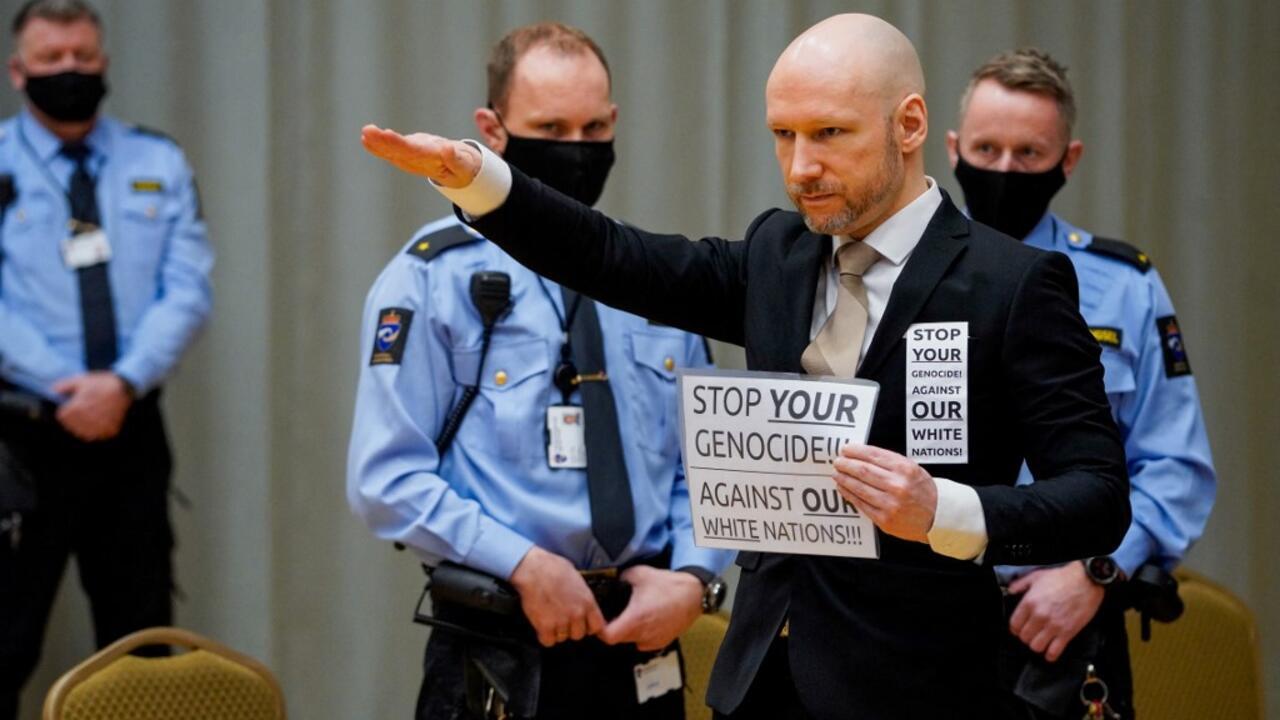Utoya massacre: eleven years later, Anders Breivik asks for his release
Shaved head and groomed goatee, Anders Breivik entered the courtroom with a sign "Stop your genocide against our white nations" in English on his briefcase and dark suit, and gave a Nazi salute as the three judges arrived.
AFP - OLE BERG-RUSTEN
Text by: RFI Follow
3 mins
In Norway, eleven years after the Utoya massacre which killed 69 people, Anders Breivik, sentenced to life imprisonment, has applied for parole.
The 42-year-old extremist took the opportunity to make ultra-radical comments that scandalized the families of the victims.
Advertising
Read more
This is the scenario dreaded by all the survivors of the Utoya massacre, and by the relatives of those who lost their lives on July 22, 2011: to witness a new
neo-Nazi diatribe
by the author of the massacre, which claims to have renounced violence, but who denies nothing of his ultra-radical far-right convictions.
Anders Brevik appeared before three magistrates, sitting for security reasons in the gymnasium of Skien prison (south) where he is imprisoned.
From the start of the hearing, the fears of the victims' associations were confirmed: today, 42, Anders Breivik appeared in the courtroom with, written in English on his briefcase: “
Stop your genocide against our white nations.
»
►
To read also: Anders Breivik: journey of a "crazy"
Breivik sends a Nazi salute to the judges and declares that he wants to continue his fight for National Socialism in a peaceful way, while declaring himself ready to give up any political commitment if the court asks him to do so.
A procedure a priori doomed to failure
Eleven years after
killing dozens of teenagers
gathered on an island for Labor Youth summer camp on the island of Utoya, Breivik is in theory eligible for parole. He was
sentenced in 2012
to 21 years in prison with the possibility of extension, accompanied by a minimum sentence of ten years – the maximum at the time.
His chances of winning are almost nil, but for the victims' associations, the damage has already been done, amplified by the retransmission of the hearing on certain media.
One of the survivors of the attack is sorry about it on social networks: “
It is not because it is scandalous or painful, but because he is a symbol of the extreme right which has already inspired several other mass killings.
»
Prior to the hearing, the support group for the families of the victims had said "
encourage to pay as little attention as possible to the terrorist and his message
".
Read also: Norway: ten years later, there is still no consensus around the Utoya massacre
Test for the rule of law in Norway
In a country that has not seen such violent crime since World War II, this three-day parole application process, while unlikely to succeed, is seen as a test the rule of law must be overcome by treating the extremist like any other litigant.
In 2016, Breivik, who has three cells in prison, a television with DVD player and game console and a typewriter, succeeded in having
the State condemned
for "
inhuman
" and "
degrading
" treatment in reason for keeping him apart from the other detainees.
The judgment was overturned on appeal.
Newsletter
Receive all the international news directly in your mailbox
I subscribe
Follow all the international news by downloading the RFI application
google-play-badge_FR
Norway
Justice
Terrorism

